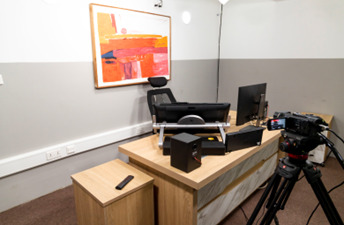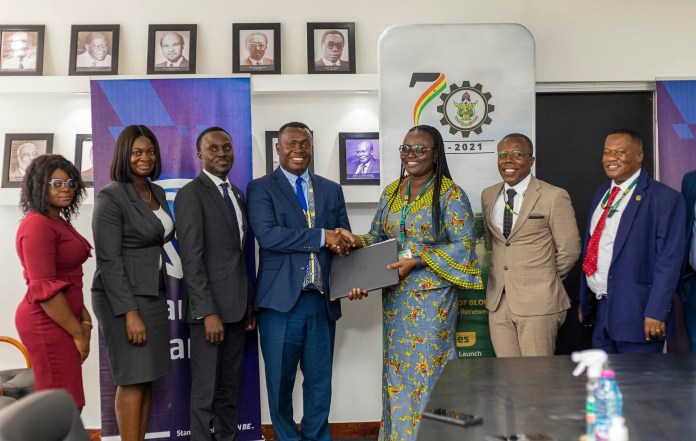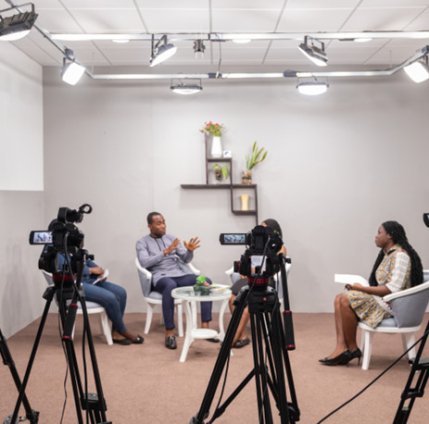The academic journeys of many tertiary students are impeded by unequal access to digital resources, which limits their exposure to quality educational materials and stunts their academic progress.
However, the Kwame Nkrumah University of Science and Technology (KNUST) is distinctively developing strategies to close the digital divide and promote an inclusive learning environment in Ghana through its E-Learning Centre.
As the United Nations Educational, Scientific and Cultural Organization (UNESCO) marks the International Day of Digital Learning on March 19, the University is exploring and employing transformative solutions to ensure equitable learning opportunities for all.
It is part of its contribution towards the achievement of Sustainable Development Goal (SDG 4).
Digital Infrastructure
Inadequate infrastructure is a major impediment to educational technology accessibility, especially in rural and underprivileged communities.
The Kwame Nkrumah University of Science and Technology is addressing the infrastructure challenges through the setting up of a $1.3 million E-Learning Centre with an additional ¢17 million in multimedia blended teaching equipment.

The centre offers online examinations, interactive online classes, asynchronous courses, and other instructional resources.
By ensuring that students everywhere have access to instructional materials, the KNUST E-Learning Centre is effectively closing the digital gap.
This is line with UNESCO’s mandate of recognizing the potential of high-quality and accessible digital learning to address educational challenges worldwide and to promote inclusive sustainable development.
"No screen can ever replace a teacher. However, when applied properly, technology can complement and enhance the work of educators. To ensure that technology improves learning outcomes and reduces inequalities, we must actively steer the digital revolution in education, on our own terms." Director – General of UNESCO, Ms. Audrey Azoulay said.
Director of the KNUST E-Learning Centre, Prof. Eric Appau Asante, also agreed and indicated that digital learning is not to veer off the borders of a physical classroom but to make education possible and accessible regardless of one's location.
“Online teaching and learning offer a lot of benefits. If the courses are developed well and the videos and materials are online, it gives the opportunity for self-paced learning,” he said.
Faculty and Students’ Training
Digital literacy among students and instructors is just as important for an effective education as having access to technology.
The E-Learning Centre trains faculty and students on digital tool usage, virtual learning platform navigation, and the advantages of online teaching and learning.
Director of the E-Learning Centre, Professor Eric Appau Asante, added that management of KNUST is also providing KNUST’s affiliate institutions with the expertise to create a supportive environment for online education.
The university has campuses in underdeveloped and hard-to-reach towns across Ghana, and the E-Learning Centre sends out its ambassadors to teach both faculty and students how to utilize digital tools and navigate online virtual platforms.
“There are different standards and skills required to develop fully online courses. That is the training we give to faculty members. We are also hoping to train some students as online learning ambassadors or champions. The idea is to help them better navigate learning management systems using online digital tools to facilitate their studies and, in the end, make them effective learners,” he explained
These periodic trainings conducted by the KNUST E-Learning Centre, is in line with UNESCO’s second priority of equipping teachers and learners with digital skills.
“UNESCO’s second priority is equipping teachers and learners with the skills to navigate digital environments. Over the past decade, UNESCO has supported 40 countries in establishing digital competency frameworks for teachers. And, in Latin America and the Caribbean, UNESCO has trained more than 5,500 teachers on media and information literacy in the past two years,” she revealed.
Inclusive Projects
As an educational institution under the Ghana Tertiary Education Commission (GTEC), the Kwame Nkrumah University of Science and Technology is actively contributing to shaping inclusive policies, programs, and projects in the digital ecosystem.
The KNUST Teaching and Learning policy seeks to provide the needed guidelines to ensure that the University offers innovative, demand driven academic programmes that facilitate the acquisition of knowledge and skills to contribute to the development of the nation.
This is one of the priorities of UNESCO which is to guide public policy.
“Thirdly, UNESCO is collecting data to identify best practices and guide public policy. In 2023, we published a major report on technologies in education, the Global Education Monitoring Report. It sheds light on such critical questions as the digital divide and private interests in education, and makes two key recommendations: first, that the best interests of pupils should always prevail; and, second, that technology should always serve education, not the other way around,” Director General Ms. Audrey Azoulay revealed.
In 2021, over 593 brilliant but needy students benefited from KNUST Vice-Chancellor’s Support One Needy Student with One Laptop (SONSOL) project.

In 2022, a total of 793 students benefitted from the initiative.
Since the beginning of the initiative, the university has distributed over 1,397 laptops to needy students.
This is to help less privileged students pursue their tertiary education and affirms the University’s sustained effort to bridge the digital gap.
This initiative is ongoing and is spearheaded by the Office of the Vice Chancellor, KNUST.
Vice-Chancellor of KNUST, Professor Mrs. Rita Akosua Dickon, believes in prioritizing digital inclusion across all educational levels and fostering an environment of equal opportunities.
“It was incumbent on the institution as a university to hook onto the virtual space because with the onset and spread of COVID-19, it had become clear that the university could no longer go at its own pace as far as the digital transformation was concerned.
As part of in-house preparations for the new order and to be able to leverage on the new ways of doing things to provide diverse online platforms to enhance teaching, learning and research, all faculty members of the university have undergone mandatory training in diversified modes of delivery, including the psychology of online teaching,” she revealed.
The laptops valued at GH¢ 3,965,000.00 were sponsored by corporate organizations.
The KNUST E-Learning Centre is tapping into the initiative of the Office of the Vice Chancellor by organizing periodic trainings for faculty members and students.
Collaborations
The KNUST E-Learning Centre can collaborate to develop solutions that specifically address the difficulties encountered in online teaching and learning by combining resources, knowledge, and technology.
The E-learning Center has worked with organizations such as the Mastercard Foundation, Texas International Education Consortium, Association of Commonwealth Universities, AgriImpact Limited, and others to transform online education.
By addressing infrastructure challenges, ensuring affordability and accessibility, providing digital literacy training, and tailored content to local needs, the digital educational landscape can be empowered.
KNUST continues to champion this cause, by providing equal educational opportunities for all.
Latest Stories
-
Paris 2024: Opening ceremony showcases grandiose celebration of French culture and diversity
3 hours -
How decline of Indian vultures led to 500,000 human deaths
3 hours -
Paris 2024: Ghana rocks ‘fabulous fugu’ at olympics opening ceremony
4 hours -
Trust Hospital faces financial strain with rising debt levels – Auditor-General’s report
4 hours -
Electrochem lease: Allocate portions of land to Songor people – Resident demand
5 hours -
82 widows receive financial aid from Chayil Foundation
5 hours -
The silent struggles: Female journalists grapple with Ghana’s high cost of living
5 hours -
BoG yet to make any payment to Service Ghana Auto Group
5 hours -
‘Crushed Young’: The Multimedia Group, JL Properties surprise accident victim’s family with fully-furnished apartment
5 hours -
Asante Kotoko needs structure that would outlive any administration – Opoku Nti
6 hours -
JoyNews exposé on Customs officials demanding bribes airs on July 29
6 hours -
JoyNews Impact Maker Awardee ships first consignment of honey from Kwahu Afram Plains
7 hours -
Joint committee under fire over report on salt mining lease granted Electrochem
8 hours -
Life Lounge with Edem Knight-Tay: Don’t be beaten the third time
8 hours -
Pro-NPP group launched to help ‘Break the 8’
8 hours

